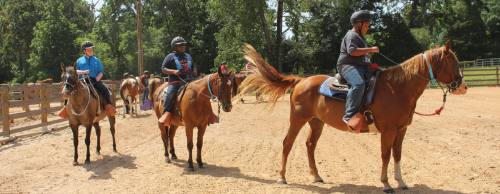 Texas ranks 47th among 50 states and the District of Columbia in the percentage of children ages 10-17 who are considered overweight or obese, according to the Data Resource Center for Child and Adolescent Health. Approximately 36 percent of Texas children are overweight, according to the resource center.
Texas ranks 47th among 50 states and the District of Columbia in the percentage of children ages 10-17 who are considered overweight or obese, according to the Data Resource Center for Child and Adolescent Health. Approximately 36 percent of Texas children are overweight, according to the resource center.
For children under the age of 18, body mass index is calculated according to age and gender due to growth and development that occurs during a child’s formative years. To be considered overweight or obese, a child must have a BMI equal to or greater than the 85th percentile for his or her age.
To combat childhood obesity, Conroe ISD provides healthy meal options, and local YMCAs offer year-round programs and summer camps that promote youth wellness.
“The main thing is nutrition and decreased physical activity,” said Roland Flanagan, a pediatrician at Texas Children’s Pediatrics in The Woodlands. “It’s a society problem. It’s a problem with kids coming home from school and watching TV or playing video games … We’ve just been engineered to work less. The ease in lifestyle has caused us to work less and spend less energy.”
Making healthy choices
Flanagan said children with two obese parents have a 75-80 percent chance of becoming obese.
“That’s kind of hard to work against,” he said. “If you have just one [obese parent], the numbers come down to 40 or 50 percent, but it still makes it a tough thing to work against.”
Side effects of obesity can be both psychological and physical, Flanagan said. Obese children are at a higher risk of developing complications with their pulmonary, muscular and skeletal systems. This can include sleep apnea, high blood pressure, joint and muscle pain, and an increased risk for congestive heart failure or stroke.
Grappling with depression and low self-esteem can also become an issue.
“As pediatricians, we probably could do a better job at motivational speaking to get [children] where they want to [get healthy],” Flanagan said. “Every time I bring it up, I’m met with, ‘This is how it’s always been; it’s so hard to get fresh fruits and vegetables; [they’re] busy [with] school.’”
Robyn Hughes, director of child nutrition for Conroe ISD said meals provided by the district meet all federal nutrition standards, including strict calorie, fat and sodium restrictions.
“Whole grains are offered at each meal as well as a choice of 1 percent or skim milk,” Hughes said. “No fryers are used in the preparation of foods in the kitchens. Students may purchase a complete meal, which includes a protein, grain, vegetable, fruit and milk.”
Students in grades seven to 12 have a la carte entree options, such as whole-grain pizza, cheeseburgers with whole-wheat buns, baked chicken sandwiches, whole-grain chicken tenders, baked fries and chips, reduced fat whole-grain cookies and reduced fat ice cream, Hughes said. All menu items meet federal nutrition standards.
“The only outside vendors are Pizza Hut and Domino’s,” Hughes said. “They have to meet the same nutrition standards as the food prepared by CISD. The pizza is reduced fat, reduced sodium and whole grain.”
 YMCA camp counselor Rose Bennett (left) and camper Savannah Dawkins complete a ceramics class.[/caption]
YMCA camp counselor Rose Bennett (left) and camper Savannah Dawkins complete a ceramics class.[/caption]
Kamp K’aana
The YMCA of Greater Houston hosts Kamp K’aana at Camp Cullen in Trinity, Texas and recently completed this year’s program. Camp lasts two weeks every summer and is geared toward helping campers make healthy habits to take home.
“During camp, they get a lot of the experiences of a traditional sleepaway camp like horseback riding, archery, all those fun experiences,” said Thy Ho-Pham, community health manager for the YMCA of Greater Houston. “They also get behavioral lessons and nutrition lessons. We teach them how to read labels, what a colorful and healthy plate looks like [and] how to change behaviors in terms of choosing certain foods over others.”
Any child age 10-14 with a BMI greater than the 95th percentile for gender and age is eligible to attend Kamp K’aana.
“We want to really encourage kids to eat a healthy plate by modeling that for them and educating them on what a healthy plate looks like,” said Lharrissa Jacobs, director of community health for the YMCA of Greater Houston.
Student Trent Smith is going into fifth grade and attended Kamp K’aana in June. He said he enjoyed all the activities at camp.
“We’ve done paintballing, wilderness survival, geology, dancing, pottery, arts and crafts and horseback riding,” Smith said.
Jacobs recommends children spend a minimum of one hour each day being active. The Woodlands Family YMCAs at Shadowbend and Branch Crossing both offer summer day camps, sports clinics and youth and family fitness classes, such as family indoor cycling and Zumba.
“If a child is in a category of being above healthy weight, we have many opportunities at the YMCA for that child and the whole family to really get healthy, be more active and embrace healthy living,” Jacobs said.
To learn more about Kamp K’aana enrollment, visit www.ymcahouston.org/youth-wellness





